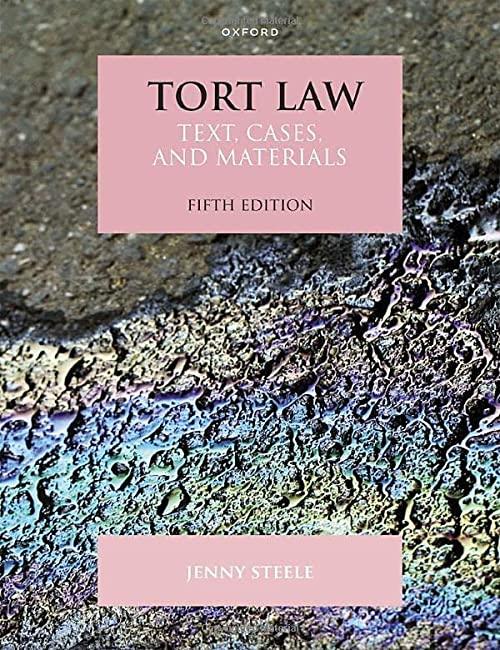Question
QUESTION 7: According to the author of our text, for purposes of questions of jurisdiction corporations are considered legal persons. True or False QUESTION 8:
QUESTION 7: According to the author of our text, for purposes of questions of jurisdiction corporations are considered legal persons.
True or False
QUESTION 8: A court could have both in-persona jurisdiction as well as in-rem jurisdiction but not jurisdiction to hear and decide the case.
True or False
QUESTION 9: What is the key point on page 34 "Samsung and Forced Arbitration." Please explain?
QUESTION 10: The sliding-scale standard is used to determine questions of jurisdiction when the question of minimum contacts in cyber space is the issue.
True or False
QUESTION 11: In the case Gucci America v. Wang Huoqing, on page 40, the court decided it did not have jurisdiction over a resident of the People's Republic of China.
True or False
QUESTION 12: Which question is best answered by considering the concept of venue.
1. Which county court within the state court system should hear the case.
2. Which State of the fifty (50) states should hear the case.
3. Whether a federal court or a state court should hear the case.
QUESTION 13: Suppose for this question that I open a Indiana based newspaper on-line and read an article wherein I believe a town in Indiana has violated the First Amendment rights of its citizens. I have no connection whatsoever with the town, the State, the residents, nor do I have a business in Indiana, nor have I visited ever, Indiana. I just am a person that loves the First Amendment and I am bored. I filing my suit in Indiana upon my first visit and my case is summarily thrown out. Why? The court has no jurisdiction over the Town. The court has no jurisdiction over me. I have no standing to bring the suit. The court has no subject-matter jurisdiction. Please explain?
QUESTION 14: For this question please read Case 2.2 on page 45. The term "res judicatory" essentially means that once the final decision is rendered the case, unless appealed, is over. This, in part, is a doctrine based on judicial efficiency. Without "res judicata" you could well imagine that disappointed plaintiffs would simply refilled the same suit under a different claim. The question: Why did Oxy, USA res judicata claim fail?
QUESTION 15: Article III federal judges serve for life during Good behavior.
True or False
QUESTION 16: Should one not like a decision of the 9th Circuit Court of Appeals, one could appeal to the 10th Circuit Court of Appeals.
True or False
QUESTION 17: A decision of the Federal Court of Appeals of a circuit is final and unappealable, unless the U.S. Supreme Court agrees to hear the case on appeal or must take the appeal by law.
True or False
QUESTION 18: The State's highest court, often called the State Supreme Court, makes the final decision on the meaning of State law and may not be appealed to the U.S. Supreme Court unless the State Supreme Court's decision implicates a federal question, such as a federal law, the U.S. Constitution or a U.S. Treaty.
True or False
Step by Step Solution
There are 3 Steps involved in it
Step: 1

Get Instant Access to Expert-Tailored Solutions
See step-by-step solutions with expert insights and AI powered tools for academic success
Step: 2

Step: 3

Ace Your Homework with AI
Get the answers you need in no time with our AI-driven, step-by-step assistance
Get Started


